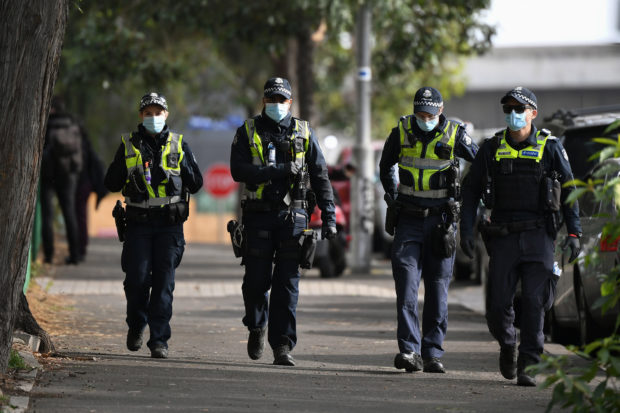
Police patrol the grounds of a public housing estate which is undergoing a forced lockdown in Melbourne on July 10, 2020, as the city records another 288 new cases in a fresh outbreak of the COVID-19 coronavirus. – Australia will slash the number of returning citizens allowed into the country by half as it struggles to contain an outbreak of coronavirus in its second-largest city, officials announced on July 10. (Photo by William WEST / AFP)
SYDNEY — In late February, Ms Raihan Suhaimi, a 28-year-old Singaporean, arrived in Melbourne to begin graduate studies and start a new life in a new city.
But her timing could hardly have been worse.
When she arrived, Melbourne’s coronavirus outbreak was in its early stages. But within weeks, the city went into lockdown.
By then, Ms Raihan had moved into a one-bedroom apartment.
She was stuck in a foreign city, without any prospect of meeting people, and classes for her master’s degree in education at Monash University – the reason she came to Melbourne in the first place – were being conducted online instead of on campus.
“I have literally made no friends,” she told The Sunday Times.
“I haven’t been to school, so I have not met anyone else at the university. I haven’t joined a gym.
“It is not like those things have been taken away from me. (My life here) just never got started.”
She added: “It has been lonely. It has been sad. I am sure people are going through worse.”
In May and last month, Melbourne began to reopen and Ms Raihan was able to have two meals at restaurants with two friends from Singapore.
But, as of last week, Ms Raihan’s glimpse of pre-pandemic normality in Melbourne has come to an end.
At midnight on Wednesday, the city’s five million residents went back into lockdown for six weeks following a worsening outbreak in the state of Victoria.
The state recorded a high of 191 new cases on Tuesday, compared with a peak of 111 during the surge in March.
Ms Suhaimi said returning to lockdown felt “isolating”. She has been working seven days a week as a behavior therapist for children aged three to five, saying she was “trying to fill up” her time.
“I am already living alone,” she said. “Now I can’t meet my friends physically… It has been kind of a lonely road.”
Victoria’s chief health officer, Professor Brett Sutton, said on Thursday that the current outbreak of the virus has probably not reached its peak, but the lockdown will help drive numbers down.
“It would be most reassuring if, in the next week, we can see numbers go down but there’s absolutely no guarantee,” he said.
The lockdown in Melbourne, Australia’s second-largest city, allows people to leave their homes to shop for food and essential items, for daily exercise and for essential work, study and caregiving.
Other states, including New South Wales, have closed their borders and barred the arrival of most travelers from Victoria.
Outside Victoria, there were just 17 new cases on Thursday, most of which involved overseas travelers.
As of Thursday, Australia had recorded 9,059 Covid-19 cases and 106 deaths.
The rise of community-spread transmissions in Victoria has been linked to security guards who worked at quarantine hotels for returning international travelers.
The outbreak has led to several clusters, including some extended families and a school that has been linked to more than 100 cases.
The virus has also spread through the state’s hospitals and aged care facilities, affecting health workers and the elderly.
Another Singaporean living in Melbourne, Dr Sarah Cheong, a friend of Ms Raihan, works as a resident in a hospital emergency department. The 28-year-old, who has been in Australia since 2012, said the return to lockdown was necessary but frustrating.
“I think everybody is a bit shocked,” she told The Sunday Times. “We were opening up and now we have gone back to what we were before… Zoom is great, but there is nothing like seeing someone in person,” she added, referring to the videoconferencing platform.
Dr Cheong was concerned about contracting the virus at work and being asymptomatic and unknowingly passing it to her housemates.
She works at a hospital where nine staff members have reportedly contracted the virus.
“Maybe after this (lockdown), things will relax again and numbers will come up again,” she said.
“It is really not sustainable. Businesses are affected. It is so sad, but I have no smart ideas about how to get things under control.”

